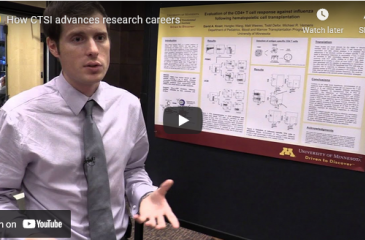Mentorship. Resources. Educational seminars. These are just a few things that came to mind when we asked researchers how the Clinical and Translational Science Institute helped them be more successful.
In our latest video, two scholars in CTSI career development programs talk about how CTSI impacted their research careers:
Mentorship. Resources. Educational seminars. These are just a few things that came to mind when we asked researchers how the Clinical and Translational Science Institute helped them be more successful.
In our latest video, two scholars in CTSI career development programs talk about how CTSI impacted their research careers:
Resources that advance research
Tetyana Shippee, PhD, a CTSI KL2 Scholar and Assistant Professor in the School of Public Health says she would not be able to do the kind of research she's doing without support from CTSI. She adds:
"My CTSI experience is vital for me in being able to do this kind of work, not just because of getting the resources and time, but also the proper mentorship and support. I really appreciate the opportunities and resources that CTSI has given me."
Dr. Shippee's research focuses on identifying and understanding what contributes to quality of life for older adults in long-term care settings. She partnered with the Department of Human Services to move forward with her project, which examined how facility and resident characteristics correlate to quality of life domains, which range from environment to personal attention.
Her goal is to design an intervention to improve quality of life for nursing home residents through better engagement and relationships with staff. She sees many opportunities to translate her findings, noting in her poster session abstract:
"While there is substantial research on quality of care in nursing homes, less is known about what contributes to quality of life for nursing home residents. A clear understanding of what impacts quality of life can inform policy and practice to improve resident well-being."
Momentum from mentorship
CTSI F&T Scholar David Knorr, MD, PhD, a Medical School trainee, also stressed the importance of having research mentors, a perk that all CTSI scholars receive:
"To me, it's all about mentorship. Somewhere along the way, you need somebody to provide that support, that advice, and the encouragement. Through the mentorship and funding from the CTSI F&T Trainee Program, I've been able to do translational research projects."
Dr. Knorr's research efforts focus on evaluating the immune response against influenza following bone marrow transplants. While such transplants can cure leukemia, patients remain susceptible to life-threatening infections for months to years afterwards. Vaccinations can provide some protection against viruses such as influenza, but a better understanding of why transplant recipients respond poorly is needed.
As Knorr notes in his poster session abstract, "Studying why some transplant recipients respond to influenza vaccination while others do not is critical to improving current clinical care."
